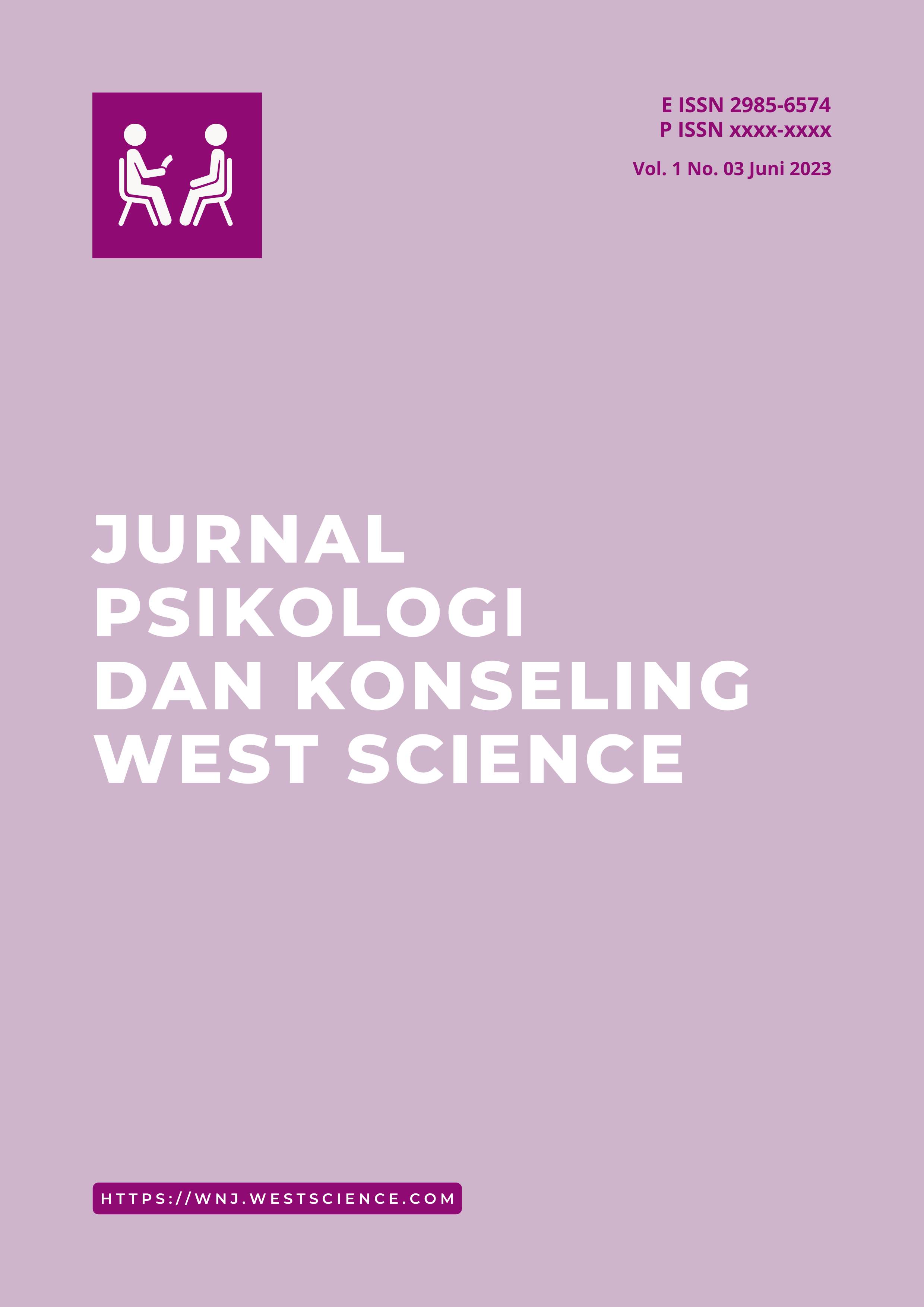Hubungan antara Perilaku Overprotective Orang Tua dan Penyesuaian Diri Remaja: Tinjauan Faktor-faktor Mediasi dan Moderasi
DOI:
https://doi.org/10.58812/jpkws.v1i03.426Kata Kunci:
Perilaku Orang Tua, Remaja, Perkembangan Remaja, Prestasi AkademikAbstrak
Penelitian ini bertujuan untuk menyelidiki hubungan antara perilaku orang tua yang terlalu melindungi dan penyesuaian diri remaja di kalangan remaja di Sukabumi. Penelitian ini menggunakan desain penelitian kuantitatif, dan data dikumpulkan melalui kuesioner survei yang diberikan kepada 400 remaja. Hasil penelitian menunjukkan adanya korelasi negatif yang signifikan antara perilaku pengasuhan orang tua yang terlalu protektif dengan berbagai aspek penyesuaian diri remaja, termasuk kesejahteraan emosional, kompetensi sosial, dan prestasi akademik. Remaja yang merasakan perilaku overprotektif yang lebih tinggi dari orang tua mereka melaporkan tingkat kesejahteraan emosional yang lebih rendah, kompetensi sosial yang lebih rendah, dan prestasi akademik yang lebih buruk. Temuan ini menggarisbawahi efek merugikan dari pola asuh yang terlalu protektif terhadap perkembangan remaja dan menyoroti pentingnya mempromosikan pendekatan pengasuhan yang seimbang yang memungkinkan adanya otonomi sambil memberikan dukungan dan bimbingan.
Referensi
Altınkaynak, Ş. Ö. (2019). Investigation of the relationship between parental attitudes and children’s receptive and expressive language skills. Universal Journal of Educational Research, 7(3), 892–903. https://doi.org/10.13189/ujer.2019.070331
Berger, L. M., & McLanahan, S. S. (2015). Income, Relationship Quality, and Parenting: Associations with Child Development in Two-Parent Families. Journal of Marriage and the Family, 77(4), 996–1015. https://doi.org/10.1111/jomf.12197
Brussoni, M., & Olsen, L. L. (2013). The perils of overprotective parenting: fathers’ perspectives explored. Child: Care, Health and Development, 39(2), 237–245. https://doi.org/10.1111/j.1365-2214.2011.01361.x
Chang, H.-T., Liu, Y.-L., & Kuo, C.-S. (2023). The Relationships Among Maternal Meta-emotion Philosophy, Maternal Video-Mediated Cognitions, and Adolescent Behavior Adjustment in Taiwan. Child Psychiatry and Human Development, 54(3), 711–721. https://doi.org/10.1007/s10578-021-01283-7
Dexter, C., & Stacks, A. (2014). A Preliminary Investigation of the Relationship Between Parenting, Parent-Child Shared Reading Practices, and Child Development in Low-Income Families. Journal of Research in Childhood Education, 28, 394–410. https://doi.org/10.1080/02568543.2014.913278
Jade, S., Rich, E. G., & Roman, N. V. (2016). The role of parenting styles and socio-economic status in parents’ knowledge of child development. Early Child Development and Care, 186(7), 1060–1078. https://doi.org/10.1080/03004430.2015.1076399
Kim, J.-I. (2018). The effects of emotional intelligence, self-leadership, psychological well-being to academic achievement of nursing college student. Journal of the Korea Academia-Industrial Cooperation Society, 19(12), 574–583.
Kumari, R., & Gartia, R. (2012). Relationship between stress and academic achievement of senior secondary school students. Asian Journal of Multidimensional Research (AJMR), 1(3), 152–160.
Lee, Y. E., Kim, E., & Park, S. Y. (2017). Effect of self-esteem, emotional intelligence and psychological well-being on resilience in nursing students. Child Health Nursing Research, 23(3), 385–393.
Marceau, K., Ram, N., & Susman, E. (2015). Development and Lability in the Parent-Child Relationship During Adolescence: Associations With Pubertal Timing and Tempo. Journal of Research on Adolescence : The Official Journal of the Society for Research on Adolescence, 25(3), 474–489. https://doi.org/10.1111/jora.12139
Mayasari, I., Arafat, Y., & Setiawan, A. A. (2021). The Effect of Principal Leadership and Teacher Performance Toward Student Achievement. Journal of Social Work and Science Education, 2(2), 188–197.
Mudra, S., Göbel, A., Möhler, E., Stuhrmann, L. Y., Schulte-Markwort, M., Arck, P., Hecher, K., & Diemert, A. (2022). Behavioral Inhibition in the Second Year of Life Is Predicted by Prenatal Maternal Anxiety, Overprotective Parenting and Infant Temperament in Early Infancy. Frontiers in Psychiatry, 13, 844291. https://doi.org/10.3389/fpsyt.2022.844291
Mushtaque, I., Rizwan, M., Abbas, M., Khan, A. A., Fatima, S. M., Jaffri, Q. A., Mushtaq, R., Hussain, S., Shabbir, S. W., Naz, R., & Muneer, K. (2021). Inter-Parental Conflict’s Persistent Effects on Adolescent Psychological Distress, Adjustment Issues, and Suicidal Ideation During the COVID-19 Lockdown. Omega, 302228211054316. https://doi.org/10.1177/00302228211054316
Nelson, M. R. (2018). Research on Children and Advertising Then and Now: Challenges and Opportunities for Future Research. Journal of Advertising, 47(4), 301–308. https://doi.org/10.1080/00913367.2018.1552218
Norhabiba, F., Fridha, M., Palupi, T., & Rohimah, A. (2019). Hubungan Terpaan Iklan Shopee Serta Tokopedia, Akses Aplikasi Dan Minat Membeli Pada Mahasiswa Untag Surabaya. Jurnal Komunikasi Dan Kajian Media, 3.2(160), 93–101.
Özkula, G., Uğurlu, M., Kuru, E., Ferda Cengiz, G., & Örsel, S. (2022). Anxiety-Promoting Parenting Behaviors in Adolescents with Social Anxiety: Controlled with a Non-Clinical Sample. Alpha Psychiatry, 23(4), 184–192. https://doi.org/10.5152/alphapsychiatry.2022.21340
Pardini, D. (2016). Empirically based strategies for preventing juvenile delinquency. Child and Adolescent Psychiatric Clinics, 25(2), 257–268.
Rockoff, J. E. (2004). The impact of individual teachers on student achievement: Evidence from panel data. American Economic Review, 94(2), 247–252.
Sánchez-Álvarez, N., Extremera, N., & Fernández-Berrocal, P. (2016). The relation between emotional intelligence and subjective well-being: A meta-analytic investigation. The Journal of Positive Psychology, 11(3), 276–285.
Shahar, H., N.A.N, R., & Baharom, A. (2017). FACTORS ASSOCIATED WITH PARENTING PRACTICES AMONG PRESCHOOLERS’ PARENTS IN AMPANG AND SERDANG, SELANGOR, 2016. 1.
Shorer, M., Swissa, O., Levavi, P., & Swissa, A. (2021). Parental playfulness and children’s emotional regulation: the mediating role of parents’ emotional regulation and the parent–child relationship. Early Child Development and Care, 191(2), 210–220. https://doi.org/10.1080/03004430.2019.1612385
Volante, L., Klinger, D., & Bilgili, O. (2018). Immigrant student achievement and education policy. Springer.
Wang, C., Cheong, Y., Zhu, Q., Havewala, M., & Ye, Y. (2022). Parent work-life conflict and adolescent adjustment during COVID-19: Mental health and parenting as mediators. Journal of Family Psychology : JFP : Journal of the Division of Family Psychology of the American Psychological Association (Division 43), 36(3), 325–336. https://doi.org/10.1037/fam0000948
Unduhan
Diterbitkan
Cara Mengutip
Terbitan
Bagian
Lisensi
Hak Cipta (c) 2023 Yana Priyana

Artikel ini berlisensiCreative Commons Attribution-ShareAlike 4.0 International License.



















 Instagram
Instagram 